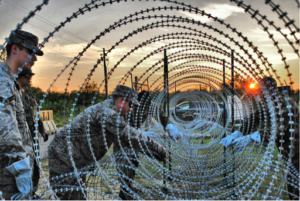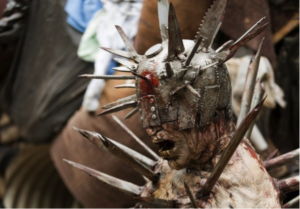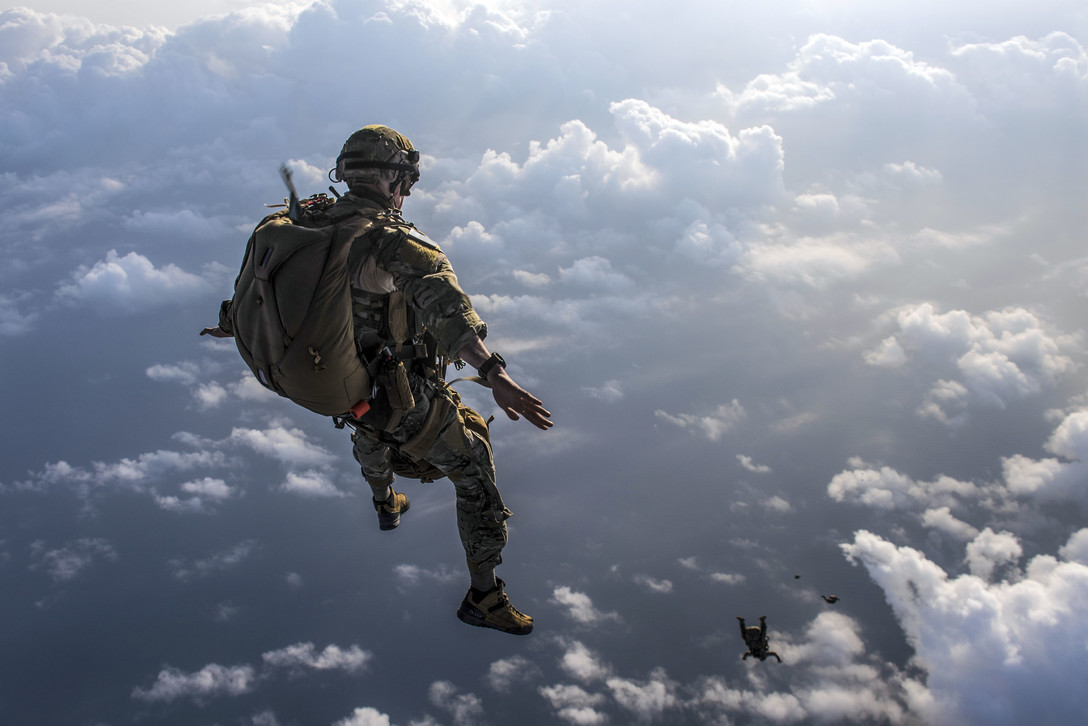
Airmen construct razor wire fences around their camp perimeter June 24 2009. Author: Staff Sergeant Nicholas Phelps
“Offensive operations, often times, is the surest, if not the only (in some cases) means of defense” – George Washington.
In other words, the best defense is a good offense. In my experience, however, veterans often deploy a kind of offensive defense in order to let anyone get close, when that may often be the best thing for them.
I’m a fan of The Walking Dead. What can I say, guilty pleasures and all that. I get it, there are a ton of ways to survive and they seem to choose the worst of them. I agree with many of the observations that a USMC Sergeant Major has made regarding the tactical ability of the cast, but that doesn’t keep me from tuning in every week. In one episode, there was a particularly nasty weaponized zombie that, to me, epitomized the attitude that some veterans take towards keeping others away.
There are a lot of reasons why a veteran thinks it may be better to be bristling with spikes and shards than to let someone close. They’ve been hurt too often, emotionally or even physically. They don’t trust others to understand what they’re going through, and don’t believe that they can truly be helped. They’d rather be alone behind stone walls with a bristling defense than have to understand what they’re going through.
The Effectiveness of the Bristling Defense

The thing about the claws and knives defense is that it works pretty well. It usually provokes one of two reactions: the shocked withdrawal, or the vigorous counterattack. I experienced this recently; I was having a conversation with another professional, who is also a veteran, who started off the conversation with hostility and judgment. About nothing in particular! I was somewhat surprised at the level of anger that seemed to come out of nowhere, and started to backpedal for a minute. This is one of the reasons that the aggressiveness is effective: the veteran has their “opponent” off balance, and eventually the other person says, “forget it, I don’t have to put up with this.” This feeds into the veteran’s idea of, “nobody gives a crap about me, it’s better for me to be alone anyway.”
A vigorous counterattack, which also comes as a result of the bristling defense, plays into the hands of the veteran as well. “AHA!” the veteran says, “they ARE against me!” Having this type of coping mechanism is a self-fulfilling prophecy, in which the veteran sets themselves up as a target for the other person’s frustration, and then holds the other person responsible for engaging the target. In my opinion, if you don’t want someone to press a particular button, you don’t put the button in the middle of the console and illuminate it with a flashing sign that says, “don’t press this button.” You’re sort of asking for trouble.
A Double Edged Sword

The problem with the bristling defense is that it does harm to both parties. If we see nothing but enemies around us, we’re going to treat them like enemies. If they weren’t enemies before, they certainly are now, and who needs more enemies? By keeping everyone at arm’s length (or spear’s length), the veteran may think that they’re keeping themselves safe, but they’re paradoxically harming themselves. It’s through relationships that we communicate, and especially through relationships that we engage with society. If we consistently drive everyone away, then we will be systematically isolating ourselves, without an opportunity to express and examine our thoughts to see if they’re valid.
The bristling defense builds a reputation that perpetuates isolation. “Man, don’t deal with that guy. He’s a jerk.” The word gets out that he’s difficult to work with, or abrasive to others, or unpleasant to be around. With so many cool people in the world, who wants to hang out with a jerk? Again, this plays into what the veteran truly wants, which is to be left alone, rather than what the veteran truly needs, which is engagement. We can only hang out with someone that throws elbows for so long, without saying “forget it” and walking away.
Awareness is key

Like with just about anything else about ourselves, it starts with personal awareness. I may not be fully aware of how abrasive I can be, or how I’ve put up a bristling defense in order to keep people out. The claws come out automatically, rather than with conscious effort. Again, the problem is that nobody sticks around to try to help the veteran become aware. It usually takes a crisis moment, or someone sticking around even after getting blasted, to help the veteran come to a place of awareness.
The problem then becomes, if someone does stick around in spite of the bristling defense, that the veteran doesn’t know how to handle it. Again, in my interaction with my aggressive veteran colleague, the claws came out and then slowly went back in. I didn’t retreat, and I didn’t counterattack, I simply patiently and repeatedly explained myself. “Well, you seem to know what you’re talking about, but they sure as hell don’t,” they said. The bristling defense seems to get the retreat or counterattack response so often, the veteran is not certain what to do when someone does neither.
If you find yourself isolated, it may be worth it to take a look at what you’re doing to create that isolation. What are you doing to make it happen? Is it helpful, does it work for you? Does it make you feel good, or is it pleasant? Likely not. There’s probably a lot of anger, and mistrust. The key is putting the claws away and letting someone in the perimeter. Find someone you can trust, who isn’t going to let go when the spikes come out again. Once you learn to trust, then you can start to heal.
 The Head Space and Timing Blog is supported by the Colorado Veterans Health and Wellness Agency, a 501(c)3 Nonprofit in Colorado Springs, Colorado. The goal of the CVHWA is to provide military culturally competent mental health counseling to veterans and their spouses, regardless of characterization of discharge, time of service, or era of service. Our vision is to assist veterans to identify and remove barriers to their mental, physical, emotional, and behavioral wellness. For questions or inquiries, contact us!
The Head Space and Timing Blog is supported by the Colorado Veterans Health and Wellness Agency, a 501(c)3 Nonprofit in Colorado Springs, Colorado. The goal of the CVHWA is to provide military culturally competent mental health counseling to veterans and their spouses, regardless of characterization of discharge, time of service, or era of service. Our vision is to assist veterans to identify and remove barriers to their mental, physical, emotional, and behavioral wellness. For questions or inquiries, contact us!



